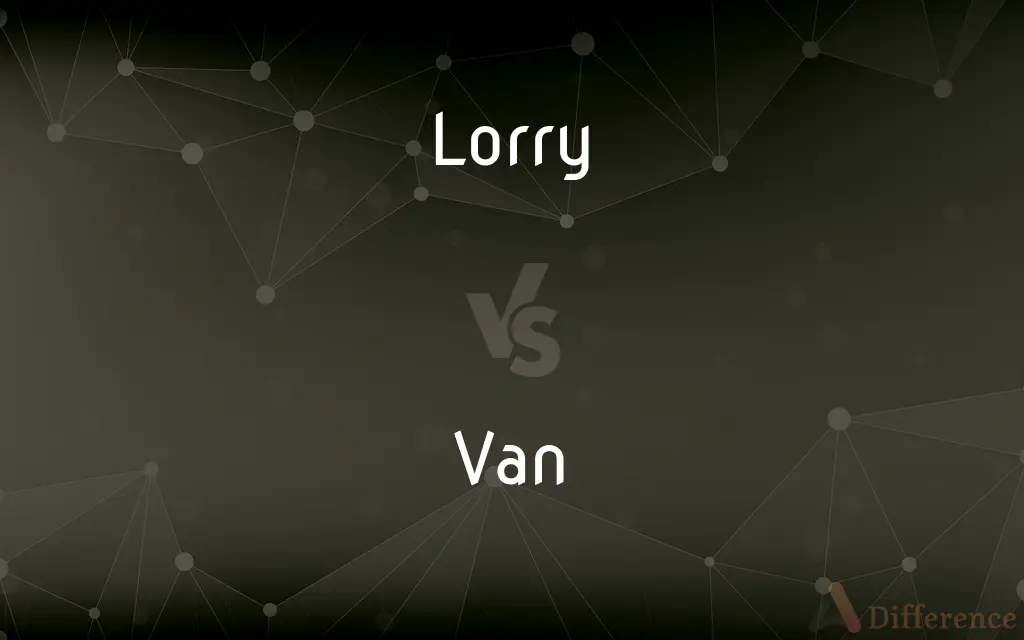Lorry vs. Van — What's the Difference?
By Urooj Arif & Fiza Rafique — Updated on March 5, 2024
Lorries are large, heavy vehicles for transporting goods over long distances, whereas vans are smaller, often used for local deliveries or as passenger vehicles.

Difference Between Lorry and Van
Table of Contents
ADVERTISEMENT
Key Differences
Lorries, known in some regions as trucks, are heavy vehicles designed primarily for transporting goods and materials over long distances. They come in various sizes and configurations, from medium-sized trucks to large, articulated vehicles with significant cargo capacities. Vans, on the other hand, are smaller than lorries and are used for a wide range of purposes, including transporting goods, tools, and equipment for businesses, as well as serving as passenger vehicles.
Lorries are characterized by their large size, powerful engines, and the ability to haul heavy loads, making them indispensable in the logistics and transportation industries. They often require special licenses to operate due to their size and the complexity of driving such large vehicles. Vans can be found in various configurations, such as cargo vans used for delivery services and minivans designed to transport people. Their smaller size compared to lorries makes them more maneuverable and suited for urban environments where streets are narrower and parking is limited. Vans do not typically require special licenses to drive, making them accessible to a wider range of drivers.
Lorries are essential for the economy, facilitating the movement of large quantities of goods across regions and countries. They are equipped with features designed for long-haul transport, such as comfortable cabins for drivers who might spend extended periods on the road. Lorries' design prioritizes cargo capacity and efficiency, often featuring multiple axles to distribute the weight of heavy loads evenly.
Vans offer flexibility and convenience for businesses and individuals alike. They are particularly useful for small businesses and courier services that require the transportation of goods but do not need the massive capacity of a lorry. Vans are also popular among tradespeople, such as plumbers and electricians, who need to carry tools and parts for their work. For families, especially those with more members or those requiring additional space for activities, passenger vans provide comfort and convenience for daily use and long trips.
The choice between a lorry and a van depends on the specific needs of an individual or business. For large-scale transportation needs and long-distance haulage, lorries are the preferred option due to their capacity and durability. For local deliveries, business needs, and personal use, vans offer an efficient and versatile solution. Both play crucial roles in transportation and logistics, each catering to different segments of the market.
ADVERTISEMENT
Comparison Chart
Size
Large, heavy vehicles for substantial cargo
Smaller, versatile vehicles for goods or passengers
Use
Long-distance transportation of goods
Local deliveries, business needs, and passenger transport
Engine Power
Powerful engines to haul heavy loads
Less powerful than lorries, designed for efficiency
License Required
Special licenses due to size and complexity
Standard driving licenses suffice for most types
Maneuverability
Less maneuverable, suited for highways
More maneuverable, suited for urban environments
Compare with Definitions
Lorry
Designed to carry large quantities of goods.
The lorry was loaded with cargo weighing several tons for interstate transport.
Van
Ideal for small businesses, tradespeople, and personal use.
The electrician used his van to carry all the necessary tools and parts for on-site repairs.
Lorry
Equipped for long-haul transport, with features for driver comfort.
The new lorry models featured more comfortable cabins for long-distance drivers.
Van
A versatile vehicle used for transporting goods or passengers.
The courier service used a fleet of vans for efficient urban deliveries.
Lorry
Operators often need special driving licenses.
The driver completed additional training to obtain a lorry-driving license.
Van
Usually drivable with a standard license.
The small business owner drove the company van using her standard driving license.
Lorry
A large vehicle for transporting heavy loads over long distances.
The logistics company added a new fleet of lorries to enhance its delivery capabilities.
Van
Smaller and more maneuverable than lorries.
The compact size of the van made it perfect for navigating narrow city streets.
Lorry
Essential in the logistics and construction industries.
Lorries transported construction materials to the site across the country.
Van
Configurations include cargo space for goods or seating for passengers.
The family chose a passenger van with ample seating for vacations and daily commutes.
Lorry
A large, heavy motor vehicle for transporting goods or troops; a truck
A lorry driver
Van
A van is a type of road vehicle used for transporting goods or people. Depending on the type of van, it can be bigger or smaller than a truck and SUV, and bigger than a common car.
Lorry
A motor truck.
Van
An enclosed boxlike motor vehicle having rear or side doors and side panels especially for transporting people.
Lorry
A truck with an open carriage
Van
A covered or enclosed truck or wagon often used for transporting goods or livestock.
Lorry
(dated) A barrow or truck for shifting baggage, as at railway stations.
Van
To transport by van
Vanned the horses to the racetrack.
Lorry
To transport by, or as if by, lorry.
Van
A covered motor vehicle used to carry goods or (normally less than ten) persons, usually roughly cuboid in shape, longer and higher than a car but relatively smaller than a truck/lorry or a bus.
The van sped down the road.
Lorry
A large truck designed to carry heavy loads; usually without sides
Common Curiosities
Do I need a special license to drive a lorry?
Yes, driving a lorry typically requires obtaining a special license due to its size and the complexity of handling.
Are lorries less fuel-efficient than vans?
Due to their size and the heavy loads they carry, lorries generally have lower fuel efficiency compared to vans.
Which is more suitable for urban deliveries, a lorry or a van?
Vans are more suitable for urban deliveries due to their maneuverability and ease of parking in tight spaces.
Do vans require any specific maintenance?
Like any vehicle, vans require regular maintenance, but the specifics can vary based on their use and model.
Can vans be used for business purposes?
Absolutely, vans are popular among small businesses and tradespeople for transporting goods, tools, and equipment.
Can a van accommodate passengers?
Yes, there are passenger van configurations designed specifically to comfortably transport people.
What kind of goods are typically transported by lorries?
Lorries are used to transport a wide range of goods, including consumer goods, construction materials, and heavy equipment.
What are the main differences between a lorry and a van?
Lorries are larger and designed for long-distance transportation of heavy loads, whereas vans are smaller, versatile vehicles for local deliveries or passenger transport.
Is it possible to use a lorry for short-distance transport?
While possible, lorries are more economically and efficiently used for long-distance haulage due to their size and operational costs.
Can lorries navigate city streets?
While lorries can navigate city streets, their large size may make it challenging, especially in areas with tight turns and limited parking.
Share Your Discovery

Previous Comparison
Logan vs. Slogan
Next Comparison
Gnome vs. LeprechaunAuthor Spotlight
Written by
Urooj ArifUrooj is a skilled content writer at Ask Difference, known for her exceptional ability to simplify complex topics into engaging and informative content. With a passion for research and a flair for clear, concise writing, she consistently delivers articles that resonate with our diverse audience.
Co-written by
Fiza RafiqueFiza Rafique is a skilled content writer at AskDifference.com, where she meticulously refines and enhances written pieces. Drawing from her vast editorial expertise, Fiza ensures clarity, accuracy, and precision in every article. Passionate about language, she continually seeks to elevate the quality of content for readers worldwide.














































